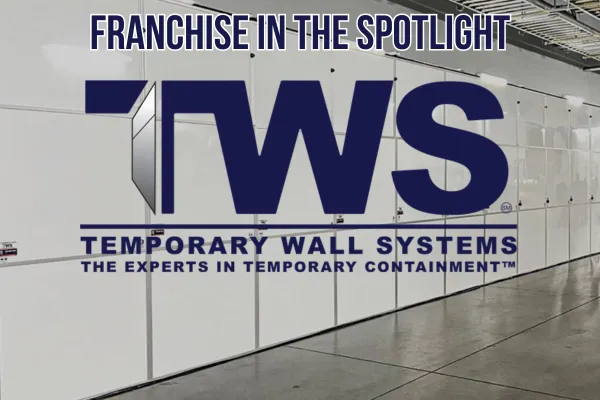
Deep Dive into a B2B, Recurring Revenue Franchise (Temporary Wall Systems)
Temporary Wall Systems: A Franchise Built for Long-Term Opportunity in Commercial Construction
If you’re exploring franchise ownership and want something beyond fast food, retail, or home services, Temporary Wall Systems (TWS) is worth a close look.
This franchise operates in a niche most people overlook—temporary containment walls for commercial renovation projects. But behind the scenes, it’s solving a widespread problem in construction, healthcare, and restoration—and doing it in a way that’s scalable, recurring, and low-overhead.
Here’s what you need to know.
What Does Temporary Wall Systems Do?
TWS rents out modular wall panels that are used to section off areas during renovations or repairs. Instead of using cheap plastic or building a drywall enclosure (which has to be installed, painted, and torn down), TWS installs a clean, professional-looking wall that’s reusable, quiet, and fast.
These walls are used in:
Hospitals (infection control)
Retail chains (CVS, Walmart)
Hotels
Airports
Restoration projects (e.g. fire or water damage)
Stadiums and schools
Jobs typically last 30 to 90 days, but some extend over a year. Once a wall system is on-site, it can be removed, cleaned, and reused on the next job—like owning rental property, but in physical space instead of buildings.
By The Numbers
Established: 2017
First Unit Franchised: 2022
Number of Franchise Owners: 89
Number of territories currently operating: 320
Liquid Capital: $250,000
Net Worth: $500,000
Total Investment: $154,444 - $366,444
Average Number of Employees: 2
Home-Based: Yes
Why Does This Business Exist?
This product was originally developed for hospitals, where drywall and plastic weren’t acceptable for infection control. But over time, it became clear that many industries needed something similar: a fast, clean way to divide up work zones in public spaces.
Contractors and facility managers were used to doing it the old way—with plywood, drywall, tape, and tarps. It was slow, messy, and expensive.
TWS now offers a better solution—and because it’s still early in market adoption, they face almost no organized competition.
What Makes the Franchise Model Compelling?
1. Low Overhead
You don’t need a storefront. Most owners start with:
A 20x20 storage unit
A basic wall inventory
A rented van or truck for transport
1–2 part-time installers
2. Recurring Revenue
Each job is a rental. Once you’ve paid off your initial wall inventory (often within the first 90–120 days of use), future jobs are almost all profit.
3. Support and Leads
The franchisor (Homefront Brands) provides:
A full onboarding and training system
National accounts and corporate lead gen
Sales support and coaching
Product innovation and upgrades
Franchisees also learn how to generate local leads by connecting with contractors, attending industry associations, and responding to RFPs (requests for proposal).
Who Is a Good Fit?
You don’t need construction experience. Most successful owners come from professional backgrounds—finance, operations, medical, tech—and are looking for:
B2B recurring revenue
A scalable model with few employees
A defensible niche without dozens of competitors
TWS is especially appealing to people who want to operate locally and eventually grow into multiple territories or related businesses.
Bottom Line
Temporary Wall Systems won’t be the flashiest brand you come across. But it’s one of the clearest examples of solving a real-world problem in a repeatable, scalable way. There’s real demand, no major competition, and a simple model that doesn’t require a lot of staff or equipment.
If you’re looking for a franchise that offers recurring revenue, low overhead, and B2B customer relationships, this is one worth serious consideration.
Interested in exploring whether TWS is available in your area—or want to compare it to similar B2B franchise models?
Let’s talk: Click Here to schedule some time with Josh
